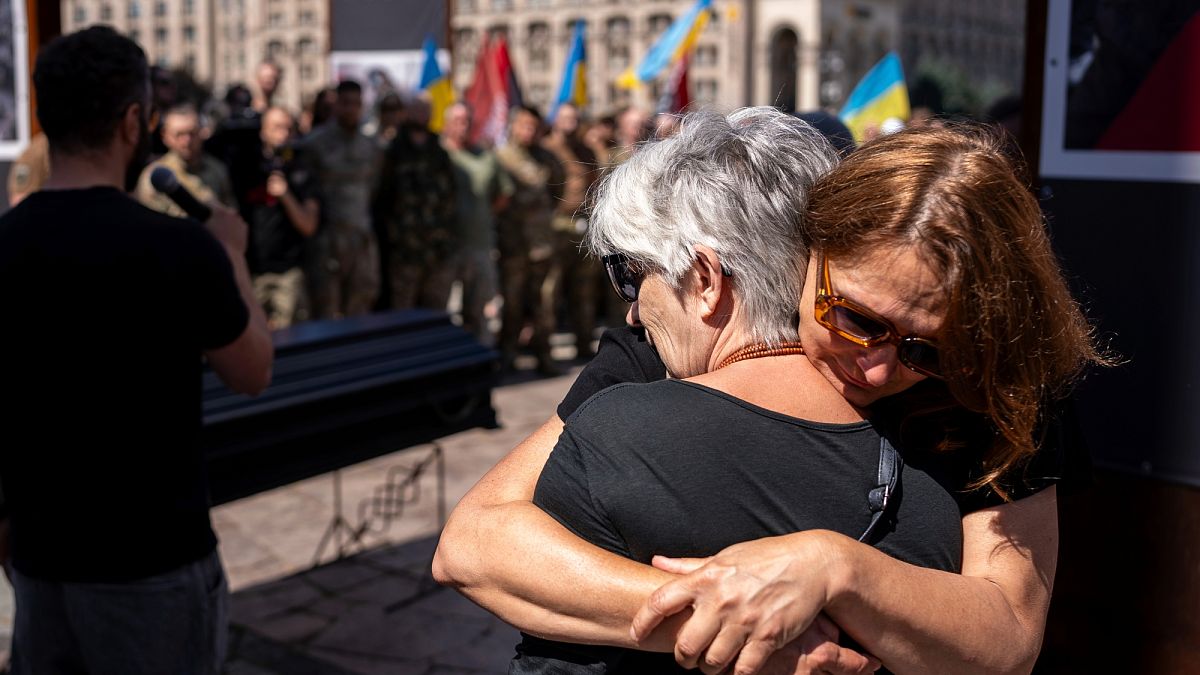Women in Ukraine are facing a surge in gender-based violence in addition to the direct threats of conflict following Russia’s full-scale invasion in 2022, the Ukraine representative of the United Nations Population Fund (UNFPA) has told Euronews.
Ulla Müller, who leads the UNFPA team in Ukraine, warned of the escalating dangers faced by women living in the country and said gender-based violence is worsening.
Violence against women tends to increase in conflict situations as instability exacerbates existing vulnerabilities, Müller told Euronews.
“Gender-based violence is the shadow of the crisis that no one talks about. That has to end,” she said, adding that it is a topic people tend to ignore because it is ugly, and no one wants to recognise it.
UNFPA reports that insecurity for women in the region is rising alongside growing tensions arising from the conflict.
“War does not allow women to move safely around the community and many areas of their cities, due to the electricity cuts and bombings,” she said, asking where vulnerable women could turn to if they also feel unsafe at home.
An estimated 2.4 million people in Ukraine—mostly women and girls—are experiencing or are at risk of gender-based violence and need support services, according to the United Nations Ukraine Humanitarian Needs and Response Plan 2025.
UNFPA’s report Voices from Ukraine gathers testimonies from women on the ground affected by gender-based violence and provides recommendations to strengthen protection and support.
“Unless we tell the world how ugly this is and how it is for women, it will not change,” Müller stressed.
Risk factors
Stress from insecurity and displacement, the pressures of war, economic hardship, power outages, and unemployment are among the risk factors identified by the agency as fuelling violence against women.
“The fact is that when men return from war, they are also hurt and they have changed, but also families have changed,” Müller said of difficulties families encounter when soldiers return from the frontline.
“They don’t know each other anymore and that combined with the mental trauma, that is also a collective one, leads to an increase in gender-based violence,” she added.
Coping mechanisms such as alcohol and drug use to manage pain and trauma further contribute to the rise in violence, the agency warned.
The prevailing narrative that glorifies returning soldiers as “heroes” can also discourage women from speaking out, the report noted.
“We have a situation where it’s shameful to talk about it for women because this is the hero returning and you don’t really want to change that image,” argued Müller.
This, together with fear of isolation, the insecurity caused by the war, and difficulties in securing housing, often prevents women from leaving abusive situations.
According to Müller, this situation requires a systematic approach that Ukraine is struggling to prioritise amid the ongoing war.
“The resources are scarce and what is really important to understand is that the government, for good reason, has a focus on the war and protecting and safeguarding the mere existence of Ukraine,” she stressed, adding the country also needs support to rebuild its society.
Reconstruction with women in mind
As Ukraine works to reconstruct damaged infrastructure and rebuild areas destroyed by Russian attacks, Müller believes this presents an opportunity to reshape society with women’s safety and needs in mind.
She stressed the importance of practical measures, such as ensuring street lighting near bus stops, supermarkets, and schools, to support women’s mobility.
Since the onset of the war, Ukraine has experienced regular power outages that have forced citizens to adapt their work, routines, and social lives.
According to data published on the Energy Map portal electricity outages lasted almost 2,000 hours in 2024.
UNFPA is urging the Ukrainian government and local authorities to implement public safety measures to reduce the risk of violence and increase the sense of security.
Investment in street lighting, accessible infrastructure and transport, and a greater presence of police and surveillance cameras in public spaces, they point out, could improve the situation for women across the country.

